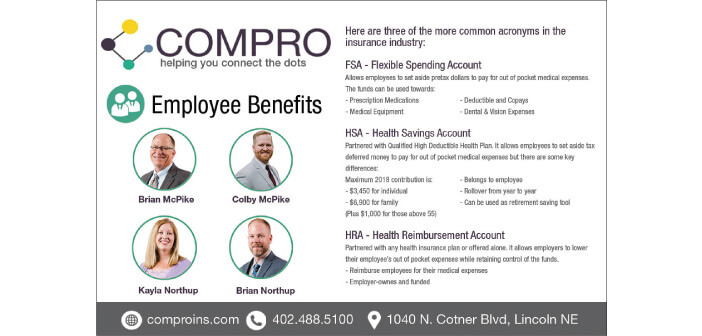FSA, HSA & HRA – Finding the Right Fit
The insurance industry is full of acronyms – PPO, HMO, TPA, POS, FSA, HSA, HRA.
We’re going to dig into three of the more common ones and give you a better idea of what they are and how they can benefit you and your employees.
FSA – Flexible Spending Account
A Flexible Spending Account allows employees to set aside pretax dollars to pay for out of pocket medical expenses. The funds cannot be used for premiums. FSA funds can be used towards:
- Prescription medications
- Medical equipment
- Deductibles and copays
- Dental & Vision expenses
FSA’s are typically partnered with health insurance plans with copays. The maximum contribution for 2018 is $2,650. Employees will want to calculate their expected medical expenses for the year and base their funding upon that as FSA accounts operate under the Use-it-or-Lose-it rule. This means that any funds deposited into the FSA must be used by December 31st or else it is forfeited. The IRS allows employers to adopt a provision that can give employees until March 15th to use up their FSA funds from the prior calendar year or roll over up to $500 in unspent FSA money.
HSA – Health Savings Account
A Health Savings Account operates similarly to a FSA in that it allows employees to set aside tax deferred money to pay for out of pocket medical expenses but there are some key differences.
- HSA accounts must be partnered with a Qualified High Deductible Health Plan
- Maximum 2018 contribution is $3,450 for an individual and $6,900 for a family plus a $1,000 catch up contribution for individuals over 55
- Account funds rollover from year to year allowing employees to build a balance above their deductible
- The account belongs to the employee. When employment terminates, the HSA account (including employer contributions) goes with the employee
- HSA accounts can be used as a retirement savings tool
HRA – Health Reimbursement Account
A Health Reimbursement Account is an employer-funded plan designed to reimburse employees for their out of pocket medical expenses. HRA’s can be paired with any health insurance plan or offered alone. The employer will designate a specific amount to credit to employees and which expenses qualify for reimbursement. Employers can decide if unused balances will rollover from year to year or if they will expire. HRA’s are employer-owned and funded; balances do not transfer to employees when employment ends. Establishing an HRA allows employers to lower their employee’s out of pocket medical expenses while retaining control of the funds.
The agents at ComPro can answer your Medicare questions. Please call (402) 488-5100 or email your questions to chrismcpike@comproins.com.


